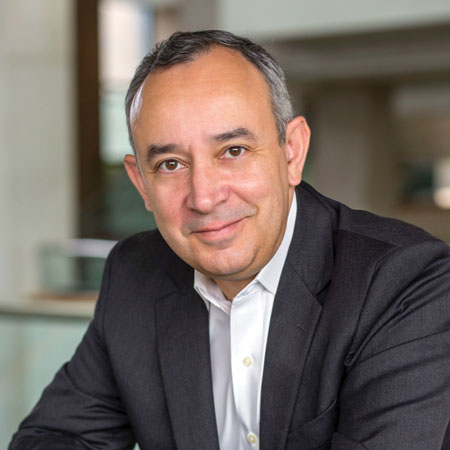BMS's Fouad Namouni On The Future Of Immuno-Oncology
Executive Summary
Early data presented at ASCO 2017 for combination immuno-oncology therapies are a hallmark of how the future treatment of cancer is going to look, Bristol-Myers Squibb's Head of Oncology Fouad Namouni told Scrip in an exclusive interview.
Bristol-Myers Squibb Co.'s Head of Oncology Fouad Namouni told Scrip on the sidelines of the 2017 American Society of Clinical Oncology (ASCO) annual meeting, held June 2-6 in Chicago, that BMS is ready to build on its foundations of using the immune system to fight cancer – with resistance to immunotherapy as its next big target.
Almost a year into his new role at BMS, having been promoted to head the US big pharma's oncology unit in July 2016, Namouni told Scrip about his expectations for the company's marketed cancer portfolio in 2017 and discussed impending disruptions in cancer R&D.
Namouni – who joined BMS in France in 1999 and previously led development for the company's programmed cell death protein 1 (PD-1) inhibitor Opdivo (nivolumab) and its anti-cytotoxic T-lymphocyte-associated protein 4 (CTLA4) drug Yervoy (ipilimumab) – also revealed how BMS will tackle the issue of resistance in patients treated with immuno-oncology therapies and gave his opinion on the future of tissue agnostic drug approvals in cancer.

Fouad Namouni, Oncology Development Head at BMS
BMS's biggest cancer rival Merck & Co. Inc.won the first US FDA tissue agnostic approval based on biomarkers last month for its PD-1 inhibitor Keytruda (pembrolizumab) in solid tumors. (Also see "Keytruda Approval Opens New Routes For Immuno-Oncology" - Scrip, 24 May, 2017.)
Let me talk about lung cancer: we brought Opdivo to second-line lung cancer at a time when people didn’t really believe it would work and they did not know much about checkpoint inhibitors. With Opdivo we put to rest decades of chemotherapy use in second-line lung cancer. In the first-line setting it is really just the beginning; we have packed the development of immunotherapy into very few years. I see first-line lung cancer as a complex disease and BMS has the most comprehensive program in this space, looking at combination immunotherapy, combinations with chemotherapy and looking at biomarkers. The treatment of first-line lung cancer is going to be set by many combinations in different populations driven by biomarkers, and we will see what are the right combinations for the right patients. That is the only way we will see incremental benefit in lung cancer.
Our pipeline was built to look at the effector T-cell and stimulate it with checkpoint inhibitors or agonists. But that is not enough because around that T-cell we have the tumor microenvironment trying to block those therapies. So, we are looking also at most of the tumor mechanisms in the tumor microenvironment.
Colony stimulating factor 1 receptor (CSF1R) is one example in the clinic; CTLA4 also plays a role not just as a checkpoint inhibitor; and most recently Indoleamine-pyrrole 2,3-dioxygenase (IDO) has come forth as an important mechanism in the tumor metabolism.
Lastly, I would say the way we have designed our pipeline is to tap into the innate immunity. Not a lot of people are looking at the innate immunity but we believe at BMS that it could be a strong ally to the adaptive immune system. When you step back, you see that we are attacking cancer and the immune system from most, if not all, the angles. BMS owns a lot of these mechanisms internally, this gives us a lot of leverage in the way we develop our medicines.
We have to continue to learn though and follow the signs. We must continue to understand biology and challenge ourselves and aim for the greatest benefit for patients that shifts the paradigms of treatment, as we did with Yervoy and Opdivo.
However, I think resistance to IO therapies is going to be a big problem and we have not improved survival in every patient. There are still patients that relapse after immunotherapy. If we can get that population of relapsed patients to a much better outcome that would be a major shift.
[Bristol presented Phase I/IIa data that demonstrated "encouraging activity" of anti-LAG-3 (BMS-986016) and Opdivo combination in heavily pretreated advanced melanoma patients who were relapsed or refractory on anti-PD-1/PD-L1 therapy. The company plans to explore this therapy in a number of other cancer types.]
